Remas, Palazzo Montini (Official Residence of the Arch-lector of Morr), Winter 2404-5

They gathered on the cloistered lawn of the Palazzo Montini. It once contained an extravagant knot garden of box-lined, symmetrically geometric divisions, crammed with a colourful abundance of herbs and sweet-smelling flowers, but the arch-lector had ordered it transformed into an ascetically simple space of nothing but grass. He had allowed a new garden to be planted elsewhere in the grounds, but the palazzo building itself was to be serenely uncluttered throughout, both inside the rooms, hallways and chambers, and even here in the open air of the central cloister. The statues were marble, unpainted, being of ancient Morrite saints …
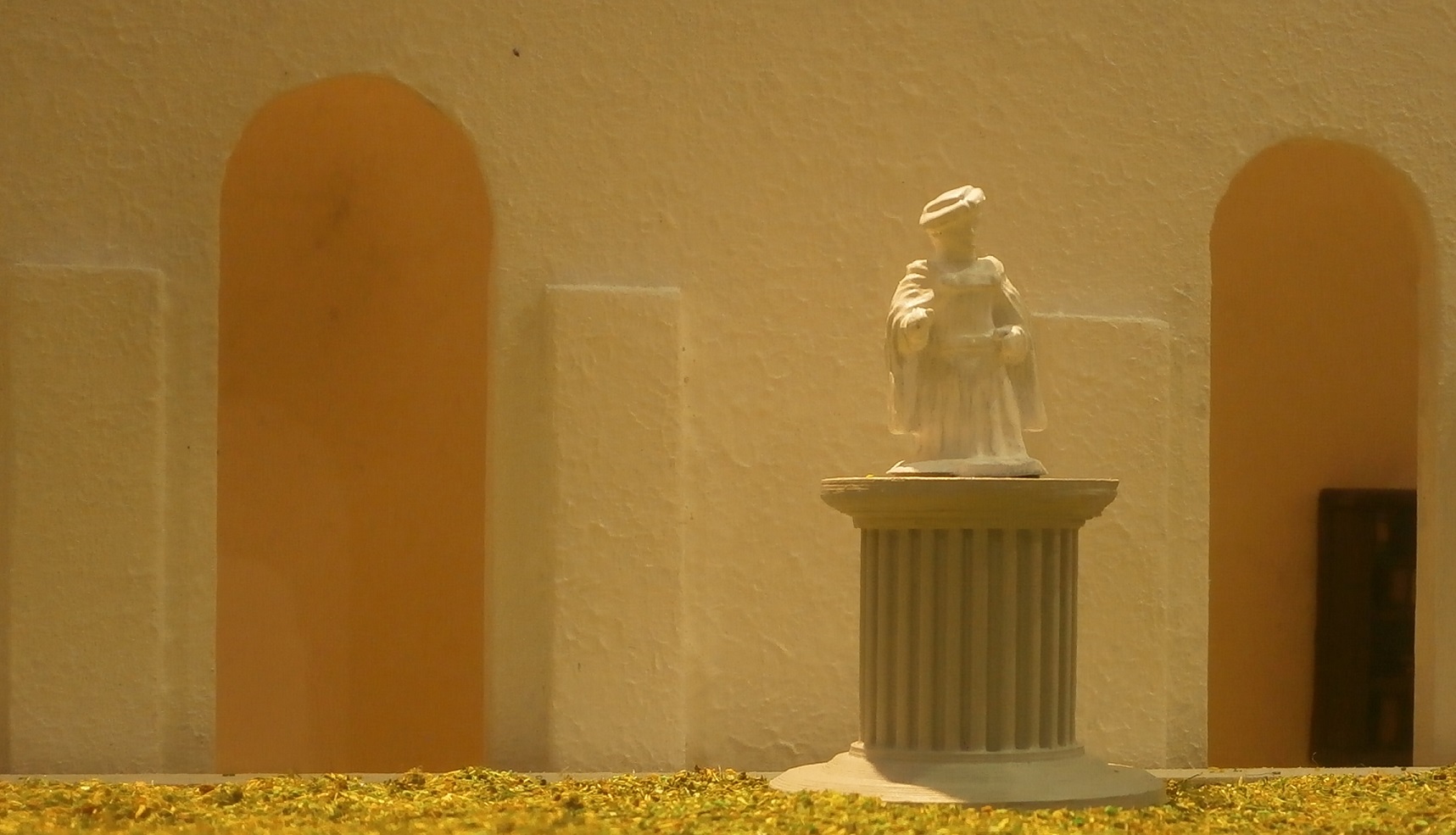
… and of the goddess Verena, wife of Morr.
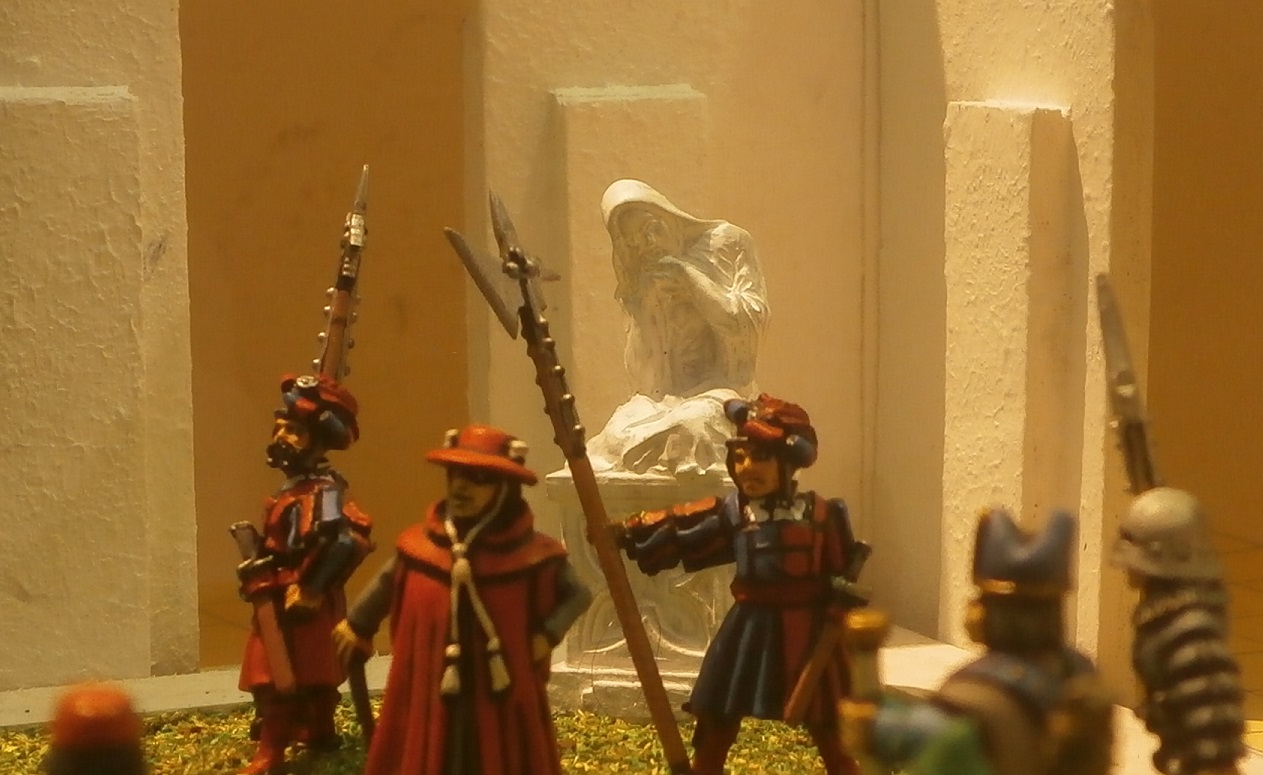
The building was granite and whitewashed plaster throughout.
The three rulers of the Triumverate churches were present, for as well as Arch-Lector Bernado, there was Flavio Tognazzi, High Priest of the Church of Mercopio and Luccino De Sicca, the Myrmidian Arch-Priest.
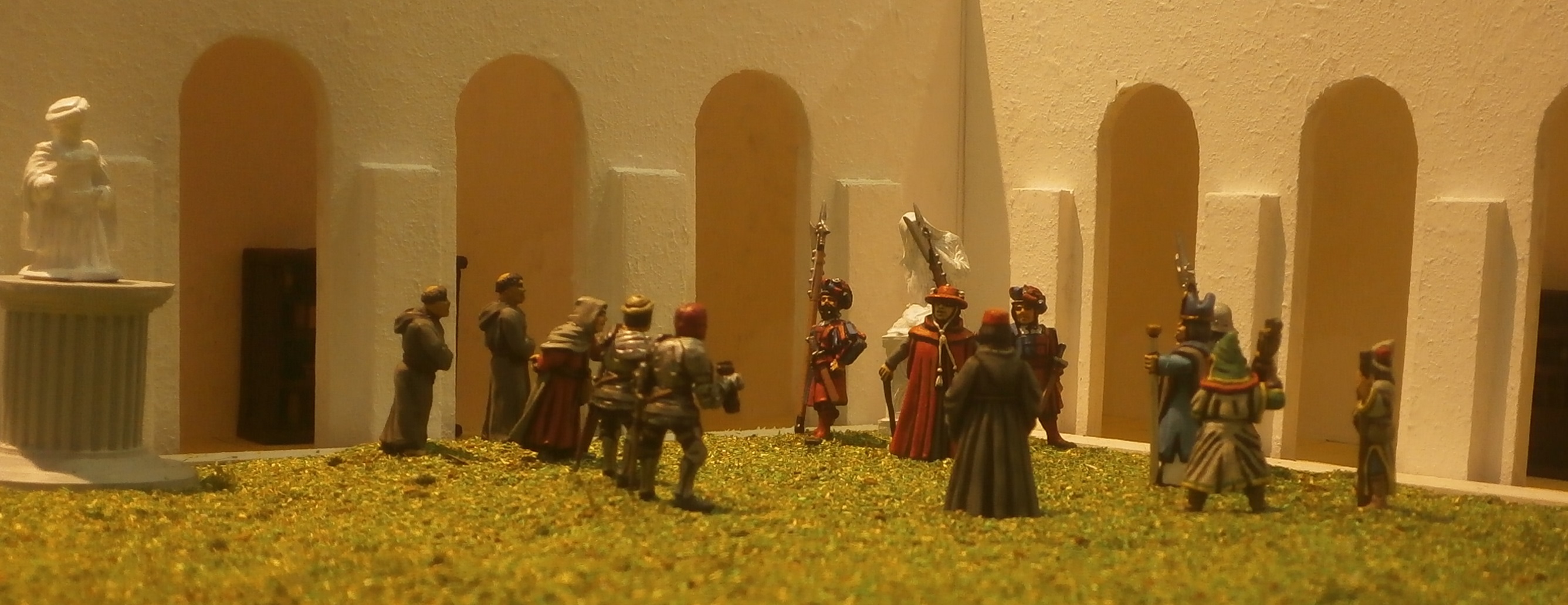
The matter they had now to discuss was of such dire importance that Bernado knew he must include these other arch-priests immediately (and afterwards whichever Morrite lectors were present in the city). As a most terrible weapon of war was a critical part of that which must be discussed, he had ordered the Reman garrison captain, Sirrus Ricci and the chief artillerist, Captain Peppe Lito also to attend. The others present were guards, clerical secretaries and some clergy selected for their wit or wisdom – the young Brother Duarte, his personal secretary, had a sharp mind, while the much older Father Benvenuto had an impressive depth of experience from his many adventures.
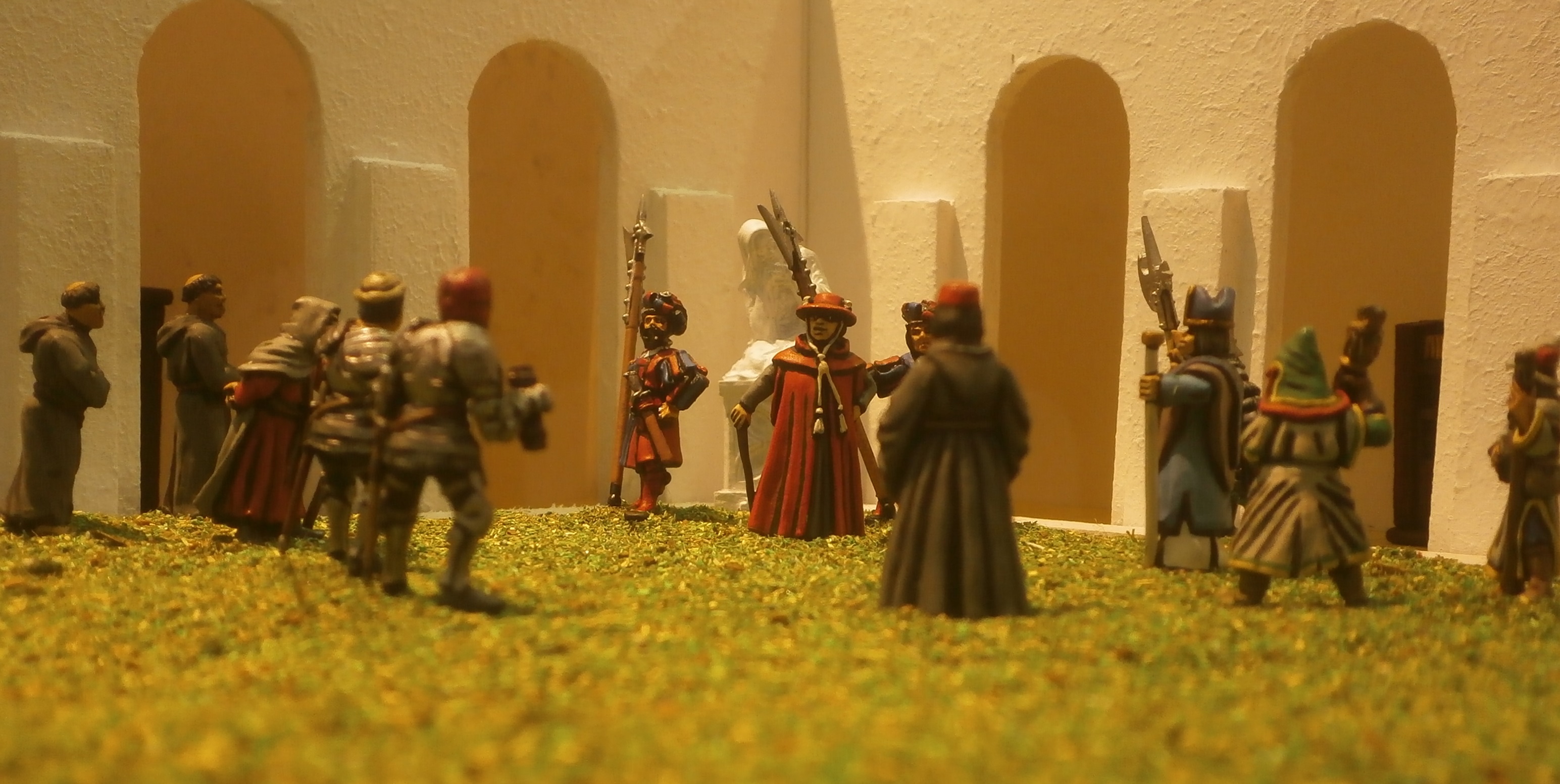
As silence fell, Bernado took a long and deep breath of air, allowing its winter coolness to infuse into him, hoping thus to invigorate his mind and thus clarify his thoughts. He dispensed with the pleasantry of greetings, to avoid any chance of small talk intruding on this solemn occasion, and so began immediately to address the issue to be decided.
“I have a most grave and urgent matter to discuss, concerning perhaps the greatest threat our city state has ever experienced.”
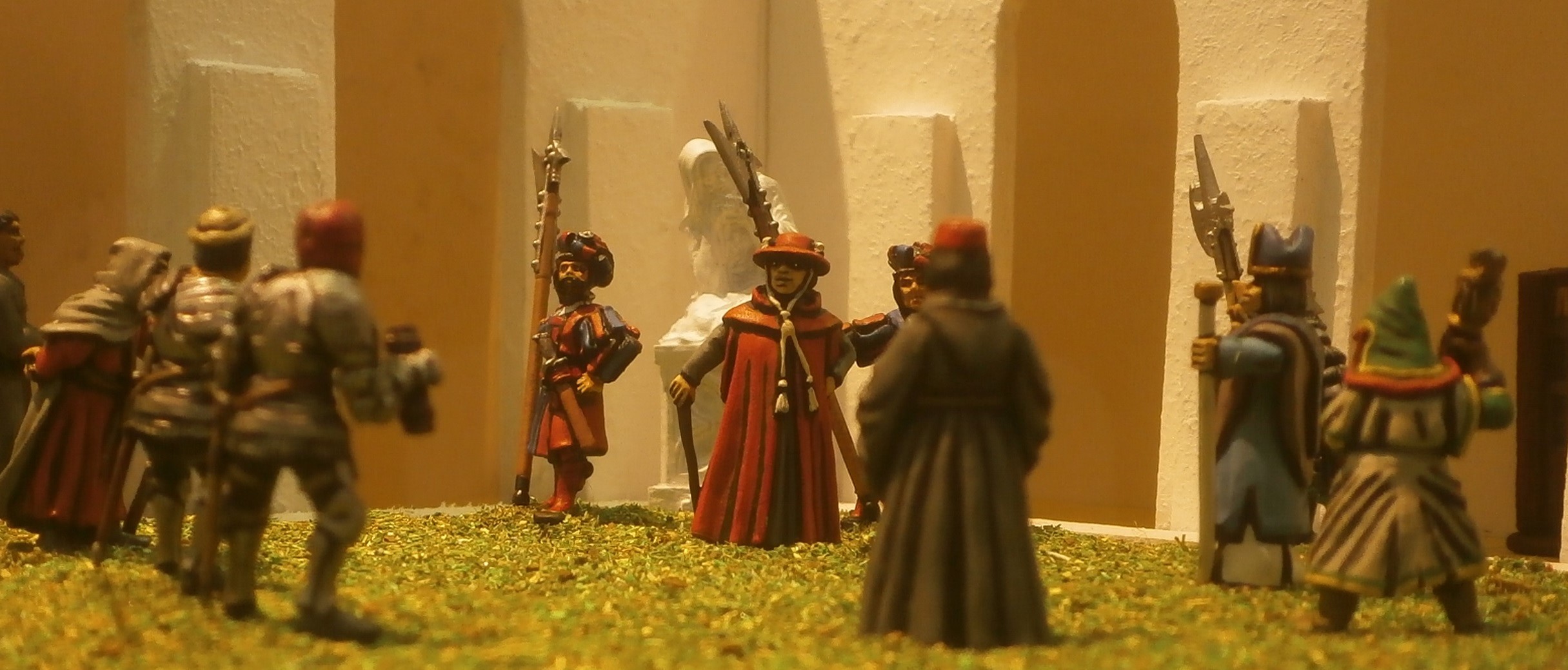
He waited just long enough to ensure everyone present had recognised the gravity of the situated, and then turned to his secretary, Brother Duarte.
“Duarte,” he commanded. “Read the letter.”
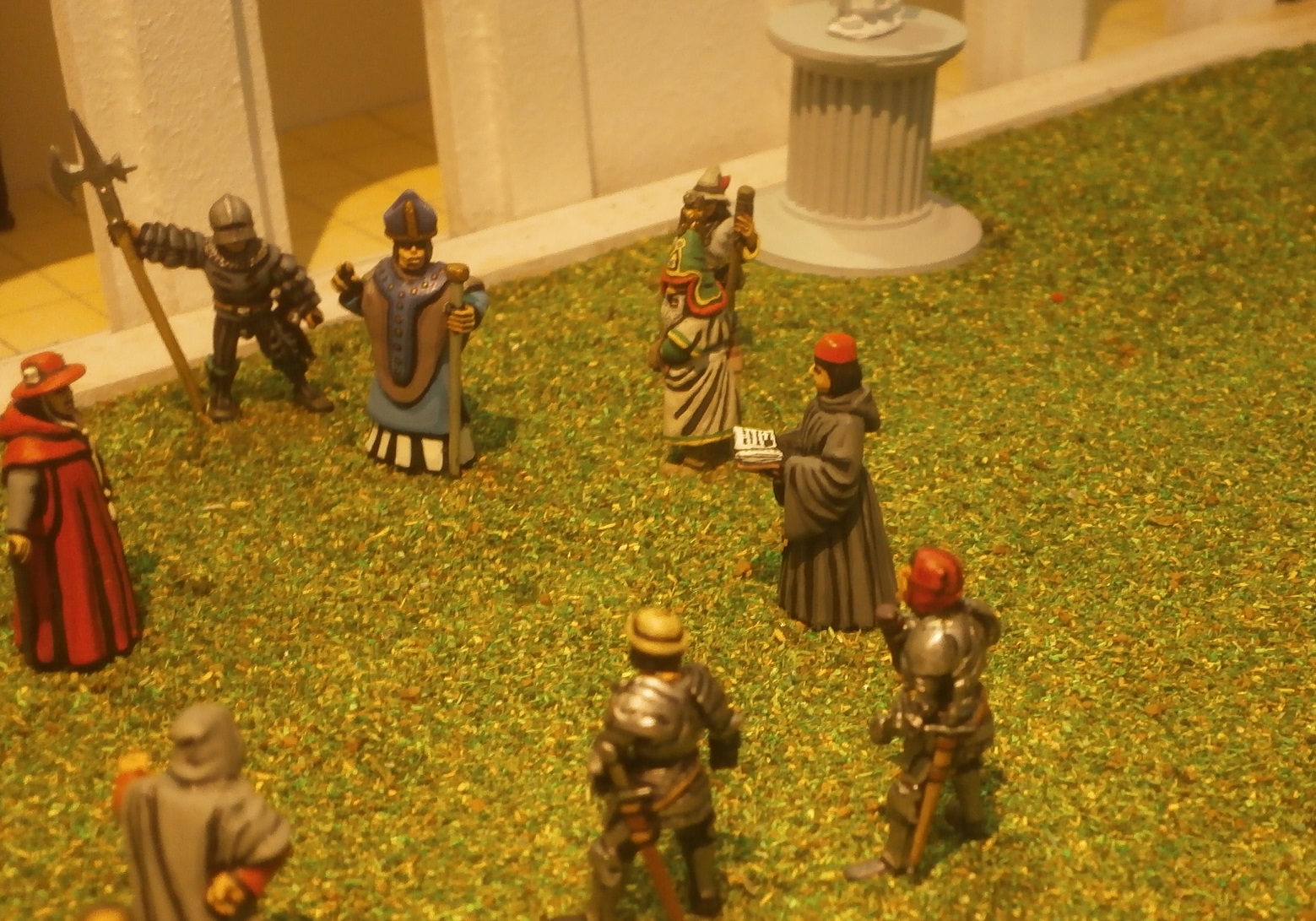
Duarte opened what had previously appeared to be a book but turned out to be a folder of worked leather containing several papers, and by some trick immediately perused the particular missive he was to read – parchment, with a dark red ink in a somewhat stark hand.
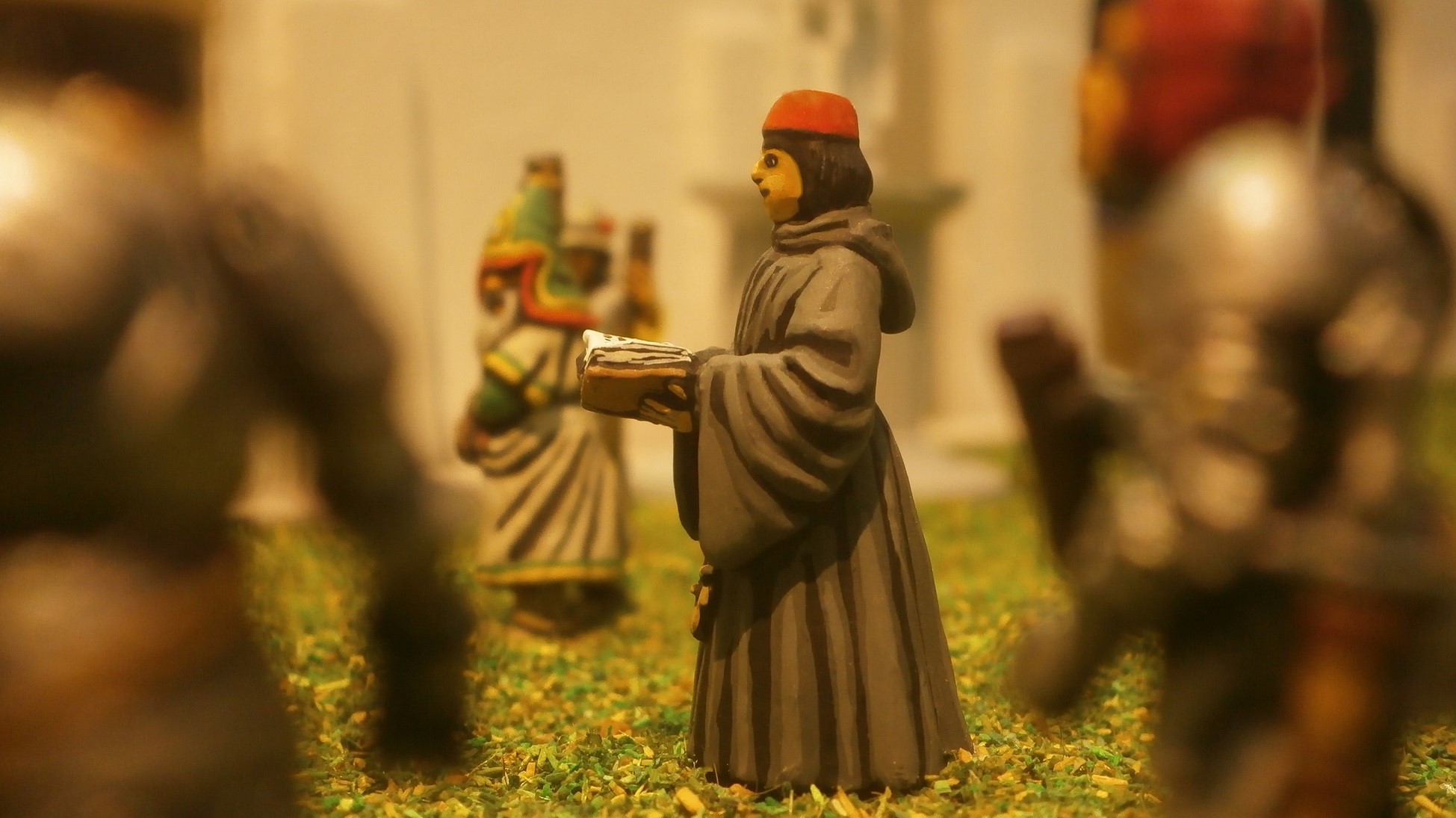
He too paused, clearly nervous, before he could speak. Coughing to clear his throat, he began …
“This to the arch-lector of Remas, Bernado Ugolini. Know and heed this missive and the words it show-contains, for thine own future, and that of all and everyone thou knows and loves, and that of every living creature in thy city-realm, depends on it.
The mighty Seer-Lord Urlak Ashoscrochor has proven his great and destructive power, destroying the army sent-dispatched against him at Campogrotta with his most terrible doom-bombard. The realm-land for many a league around was poison-killed, and even now the river that flow-runs through the tainted ground bears not one living fish, nor even one green-hued weed.
Understand that this was not the only such engine of war in his Great-Highness’s possession, for the diligent ingenuity of his servant legions knows no bound-limit. Nor was that engine, despite its great power-force, the most mighty that could be construct-fashioned. The engines his Almighty Highness now possess-commands, far surpass in awful power that of the first-such, for they can hurl-throw several great-grenadoes, each one containing a still more massive curse, so that cities and towns, armies and allies, indeed entire realms might perish in little more than an instant-moment.
Horde thy gold and silver; prepare thy labourers for a new service; stockpile thy grain, timber, flesh-meat and all tradeable commodities, for such may be necessary-required should his Highest-Highness approach thy realm, and in great and bountiful quantities. Otherwise, be prepared to quit any place, assemble thy servant-people wheresoever thou art commanded to go or surrender whatsoever is demanded of thee.
Only one warning shall be given-delivered, no more. If that is not obeyed, and the demands made therein not swift-summarily satisfied, then a final and terrible doom will befall thy home-realm. Every living creature will perish die, and the corruption so sown will hold that place in its deathly grip for many decades. If thou foolishly think to send-march an army against us, know that, howsoever mighty, it will perish-die in little more than an instant when the bombard’s doom is quick and easily brought to bear upon it. And if thou think to send spies, saboteurs, or assassins against us, know and understand that there is no possibility of penetrating the legion of steel-armed, sharp-eyed, acute-eared warriors who always and ever guard both the doom-bombard and his Highness.
The single action that will save thee and thine, will be immediately to obey-grant his Highness’ wish-demands. Yield unto him all and everything that he asks, and not one jot or tittle less, for then, and only then, will thou not suffer the cruellest and direst of consequences.
Furthermore, His Great Mightiness demands of thee now, this moment, that thou deliver-bring the maestro Angelo da Leoni to Trantio and yield him unto our custody. Satisfy this, our immediate demand, and we shall not now approach thy city-realm, and instead choose-find another victim for our inevitable and unavoidable infliction of doom.
There is no time to delay or dawdle. Act now, work quick, obey promptly, and when the demand is made, make haste, or bear the blame for a great annihilation.”
The shock throughout the gathered company was palpable. Bernado gave them a few more moments to allow the situation to sink in.
“We know they are capable of such destruction,” he said quietly, for the cloister was so silent there was no need to raise his voice any louder. Turning to the old priest, he said, “Father Benvenuto?”
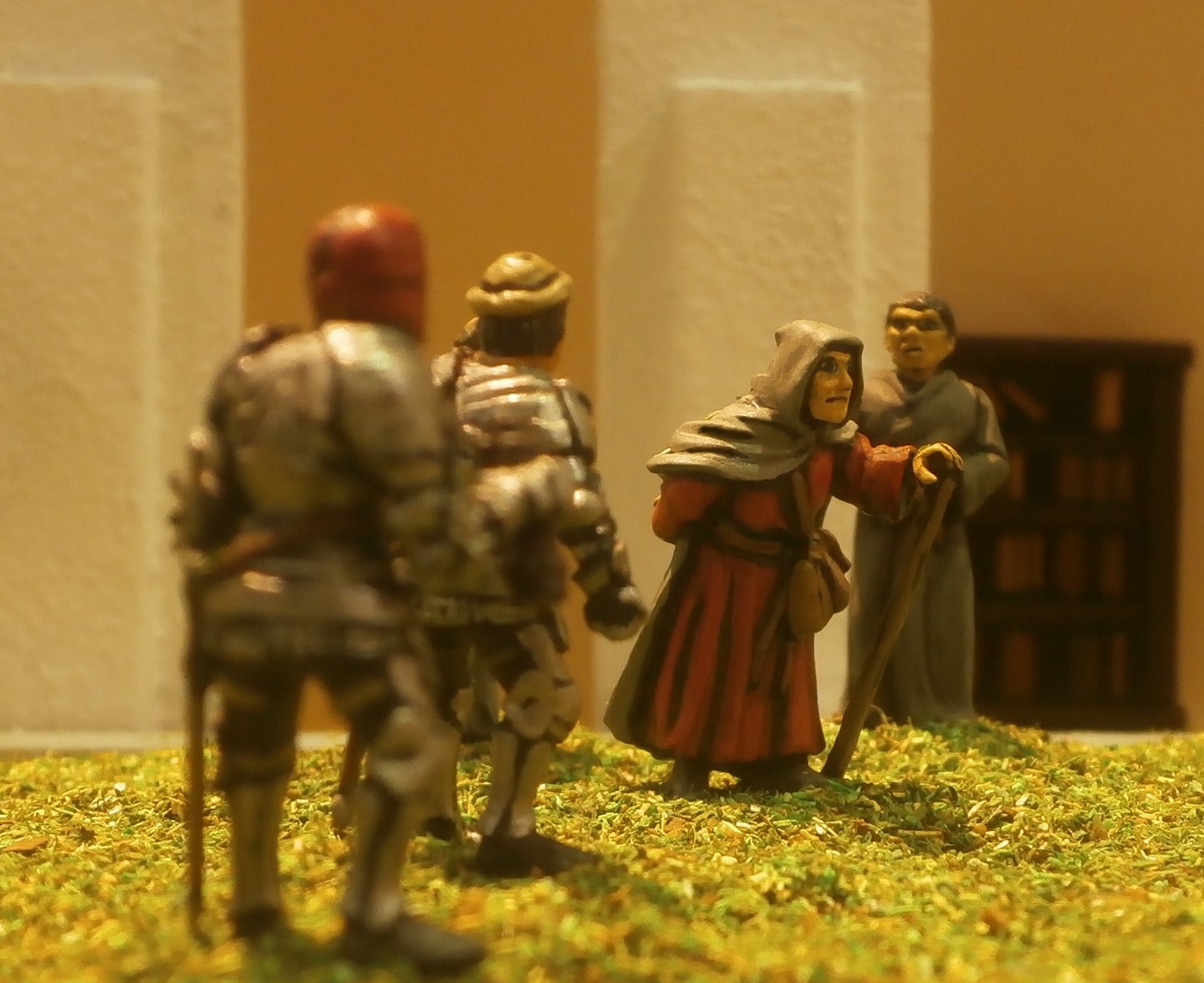
“Indeed, your holiness,” answered the priest. “It has been confirmed that although they failed to lob their grenado into the city of Campogrotta itself, its explosion was sufficiently large and forceful to kill, almost to a man, all those within two thousand braccia, including several entire regiments of men and dwarfs, then tainted the land so thoroughly even a mile further out, that nothing could grow there, nor could anyone even step upon the ground for more than an hour or so without suffering sickness and in many cases death.”
“Now this letter claims they have more such bombards,” said the arch-lector, somewhat needlessly. “And that they will use them against us if we do not bow to their demands.”
Still, no-one spoke. The arch-lector looked at each of them in turn.
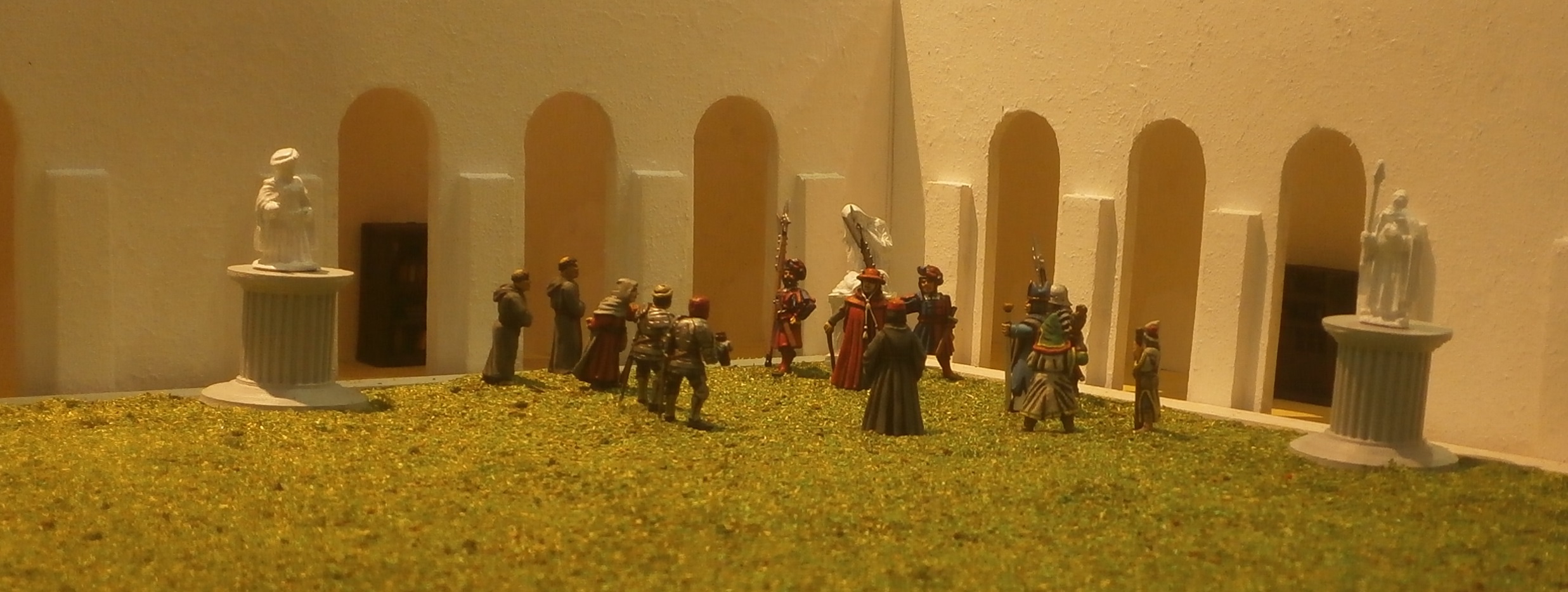
“Well,” he asked. “What say you? What is our best course of action?”
The Mercopian high priest, Flavio Tognazzi, took a sudden gulp of breath, then spoke,
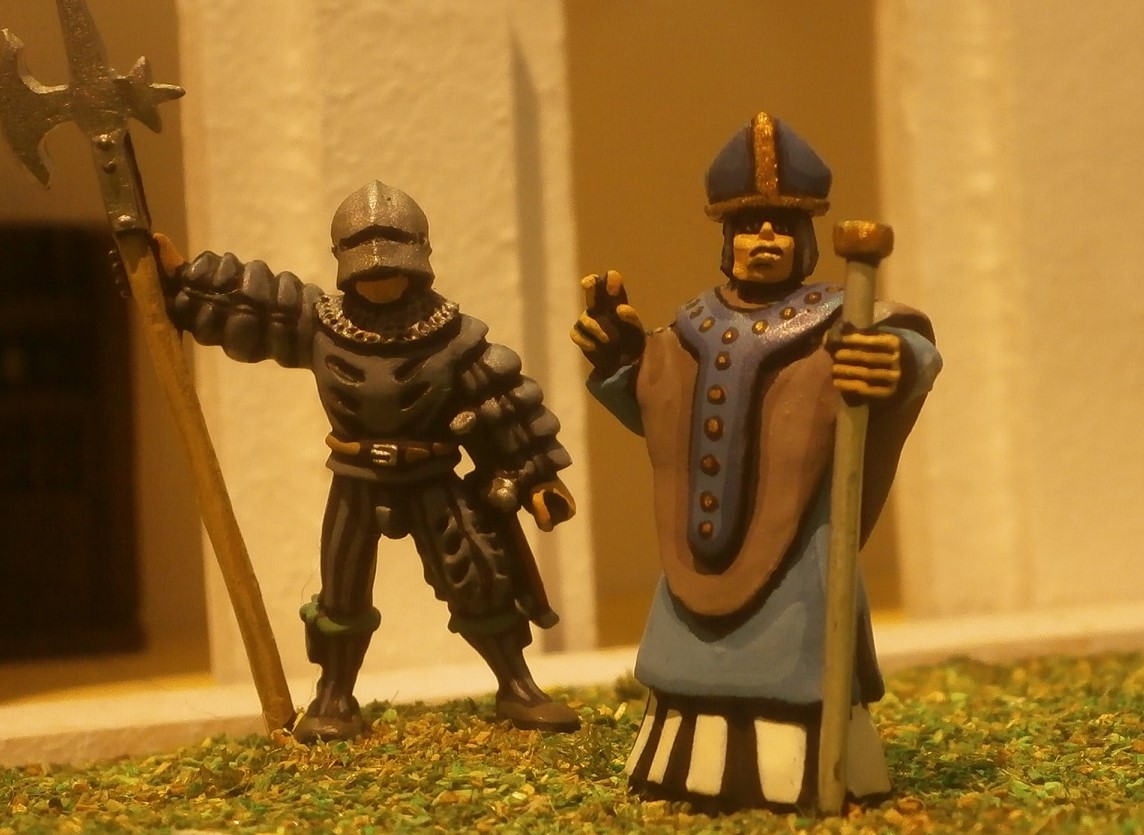
“They clearly demand goods and commodities. Perhaps we could make a stockpile of such things, sufficiently large enough to satisfy their expectations, even if only to delay them, thus buying time for relief to come from allies. The realm’s merchants could be asked for a voluntary donation of old stock and surplus commodities, sprinkled with smattering of goods of fine quality. Such would go against our Mercopian strictures for fair dealing, but it is entirely permissible when paying a ransom to those who would do us so great a harm. Surely this way we could fool them? I mean to say, do such vile creatures even know the true worth of things?”
It was the Myrmiddian arch-priest Luccino De Sicca who answered,
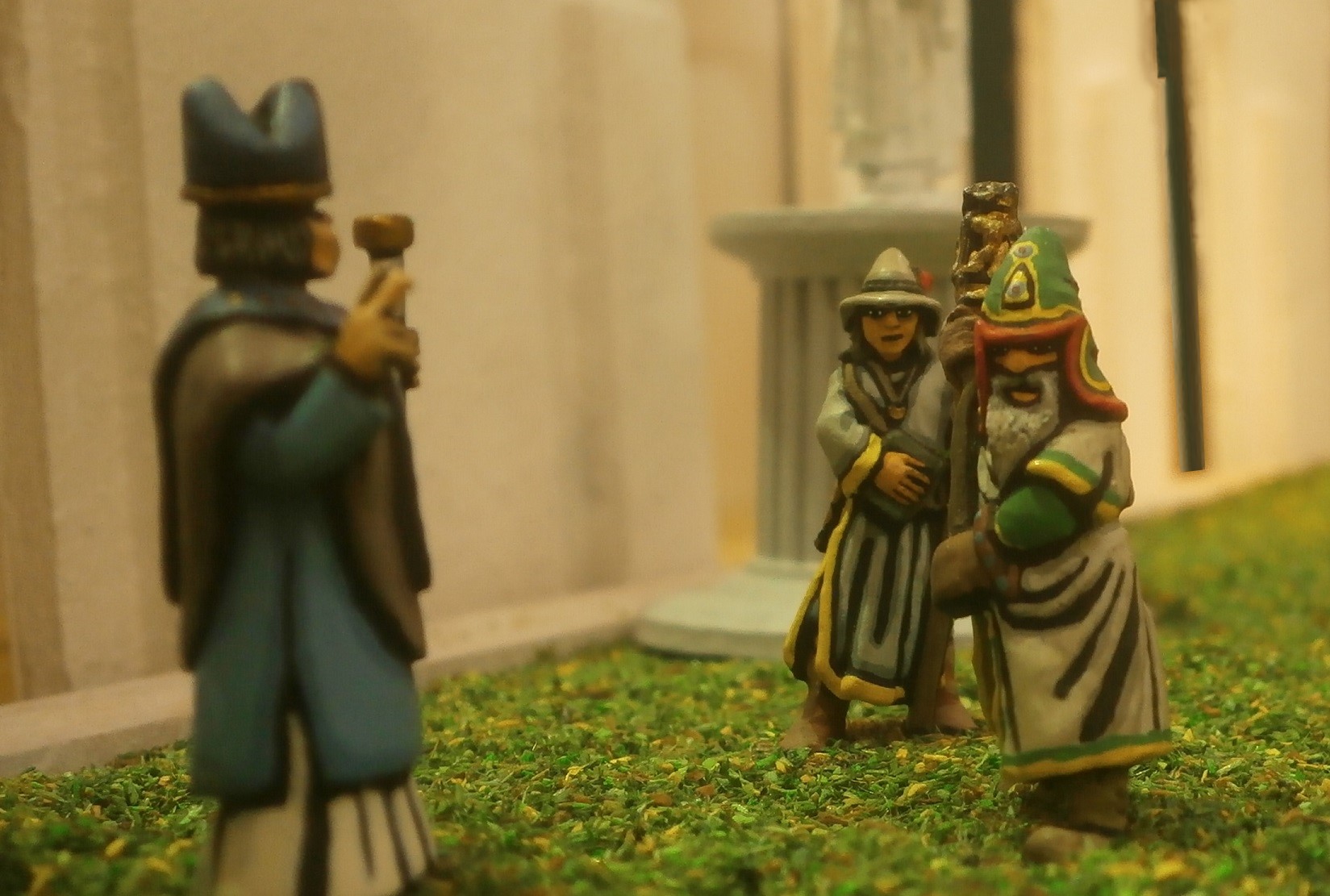
“Not only will they surely know gold when they see it, but they are ingeniously cunning engineers and so will have a full understanding of worth, weight and measure. Such tricks might fool goblinkind, but not these ratmen. Besides, even if they were like goblins, their bellies would tell them soon enough if we failed to feed them as they demand.”
Father Benvenuto raised his hand to draw attention.

“If I may say, your holiness, the letter does not merely ask for payment, but, and I think these were the words: ‘whatsoever is demanded’. They might command anything – ordering us to leave Remas or have our soldiers lay down their arms. They might offer enslavement in exchange for our lives and think themselves generous in so doing. Their kind have long used slaves of every race for their wicked ends, working them to the death so cruel is their mastery, so heinous the demands they make of mortal captives. And they have already made one demand – that we deliver up the maestro to them.”
“Well, that is preposterous,” sputtered Tognazzi. “They demand one man and in return they will spare our city! What could they gain from one man?”
“We cannot know,” said Bernado. “It is possible the maestro possesses some secret they wish to learn, or perhaps he is master of some arcane art they wish their own engineers to acquire. He most recently fashioned the steam engine and lightning cannon, both of which we know they also employ in their armies. Perhaps they wish to improve their own designs? Perhaps they simply intend to squeeze every drop of ingenuity from him? There must be many possible reasons.”
“If I may speak, your holiness,” said Brother Duarte as he ran his finger down the parchment to a certain spot. “They do not offer to spare the city, as his grace, Flavio suggested, only that if we deliver the maestro that they shall not now approach. This does not mean they will not return later with further demands. Why would they stipulate all the particulars of our future submission if they did not intend to take more? If the maestro was all they wanted they would make that demand alone.”
“It matters not what they demand in particular, nor when or upon what exact terms,” said the Myrmidian De Sicca. “Whatever we yield, by doing so we reveal their power over us, and then they will then want more, simply because they know they can take it. Their ambition knows no bounds, they would steal everything in the world if they could, and they despise all other creatures. Any deal they honour would only be done because it suits some greater goal, some further theft, some future conquest. Ultimately, all who deal with them come to ruin.”
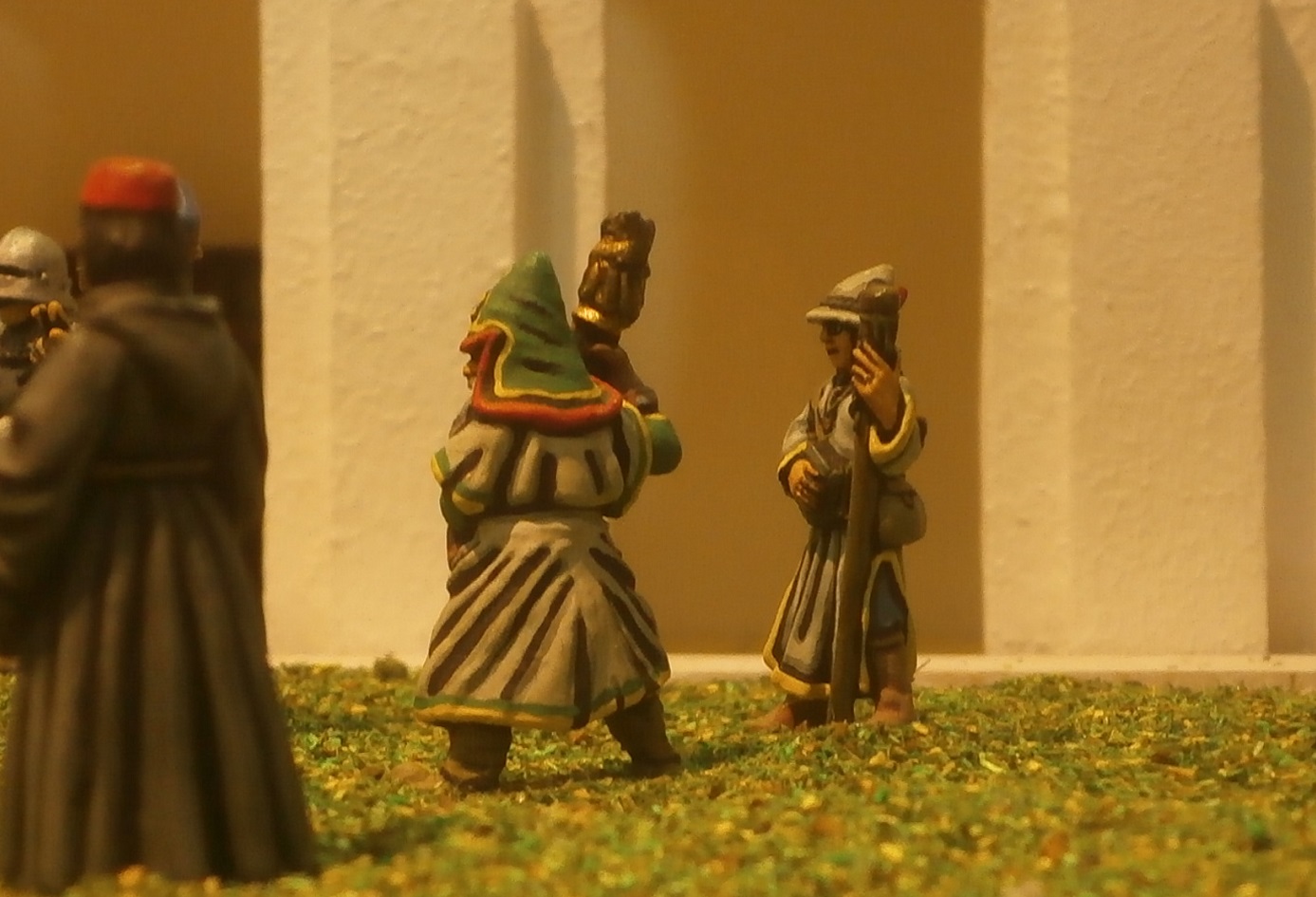
He made a point of not looking at the arch-lector Bernado as he made this point, for all present and indeed all in Tilea knew of the generally supposed treachery of his antecedent Frederigo Ordini, who (although never formally tried and proven to be guilty, only later declared so) was believed to have agreed an alliance with an uomini ratto faction that led to the annihilation of an entire army in the swamps east of Miragliano.
“I cannot argue,” said Bernado. “What you say your grace is most likely. Yet, if we do not somehow respond, whether by yielding to them, or defeating them in battle, or merely luring them elsewhere, we risk the entire city suffering the same fate as the army at Campogrotta. It is said that only three men came away alive from that field of battle, and many more suffered and died from merely being in its vicinity. Their capabilities are proven fact, despite any or all of their words likely being lies. And it is historically proven that when they go to war they can field veritable hordes of their vermin warriors. Now they have these war engines too.”
He turned to the two captains present. “This is why I have asked you here, Captain Ricci, Captain Lito. I would hear what you suggest regarding the military responses open to us.”
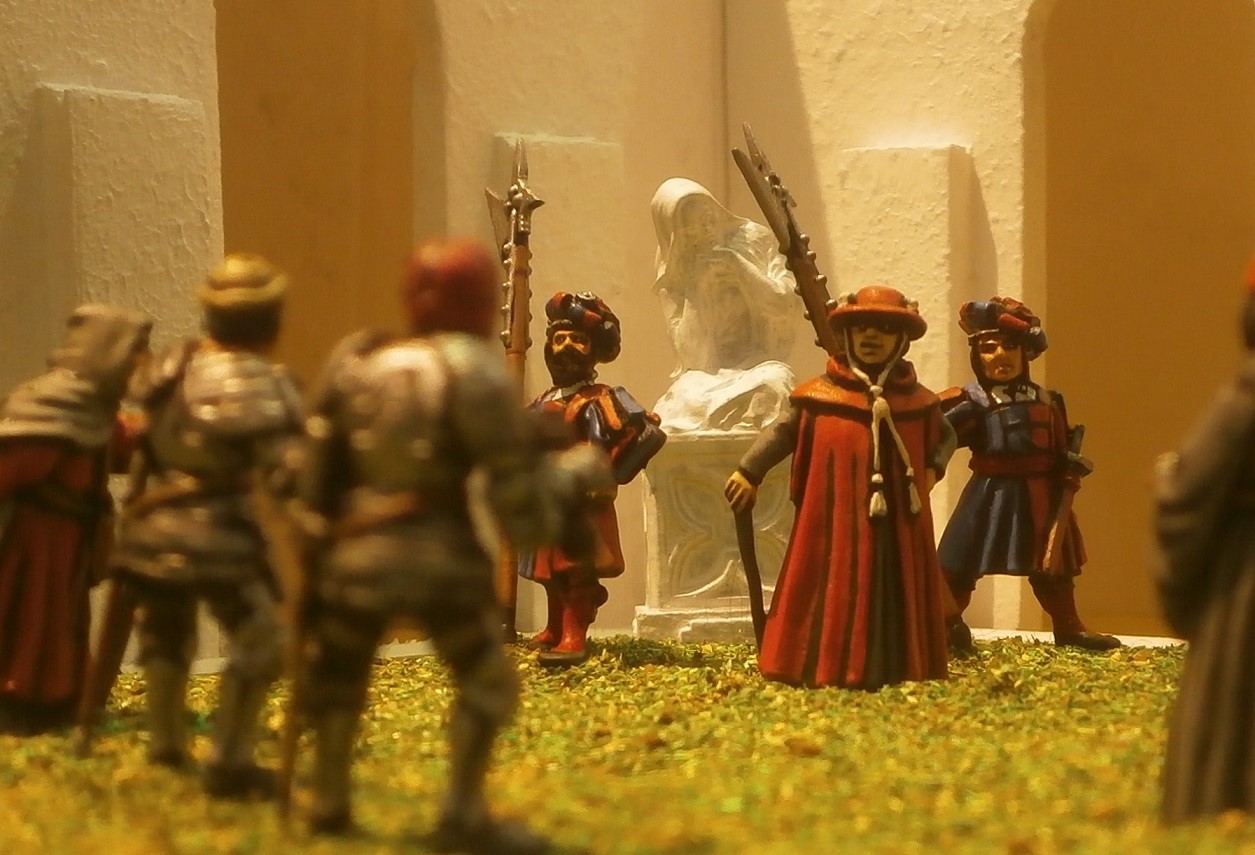
Captain Ricci had yet to be elevated officially to generalship since the death of Captain-General Scaringella on the Via Diocleta. It had been widely presumed that the promotion would go to Captain Soldatovya instead, when he returned from the war against the vampires, but he never did. Ricci was, nevertheless, despite his lesser rank, the military commander of the army of Remas.
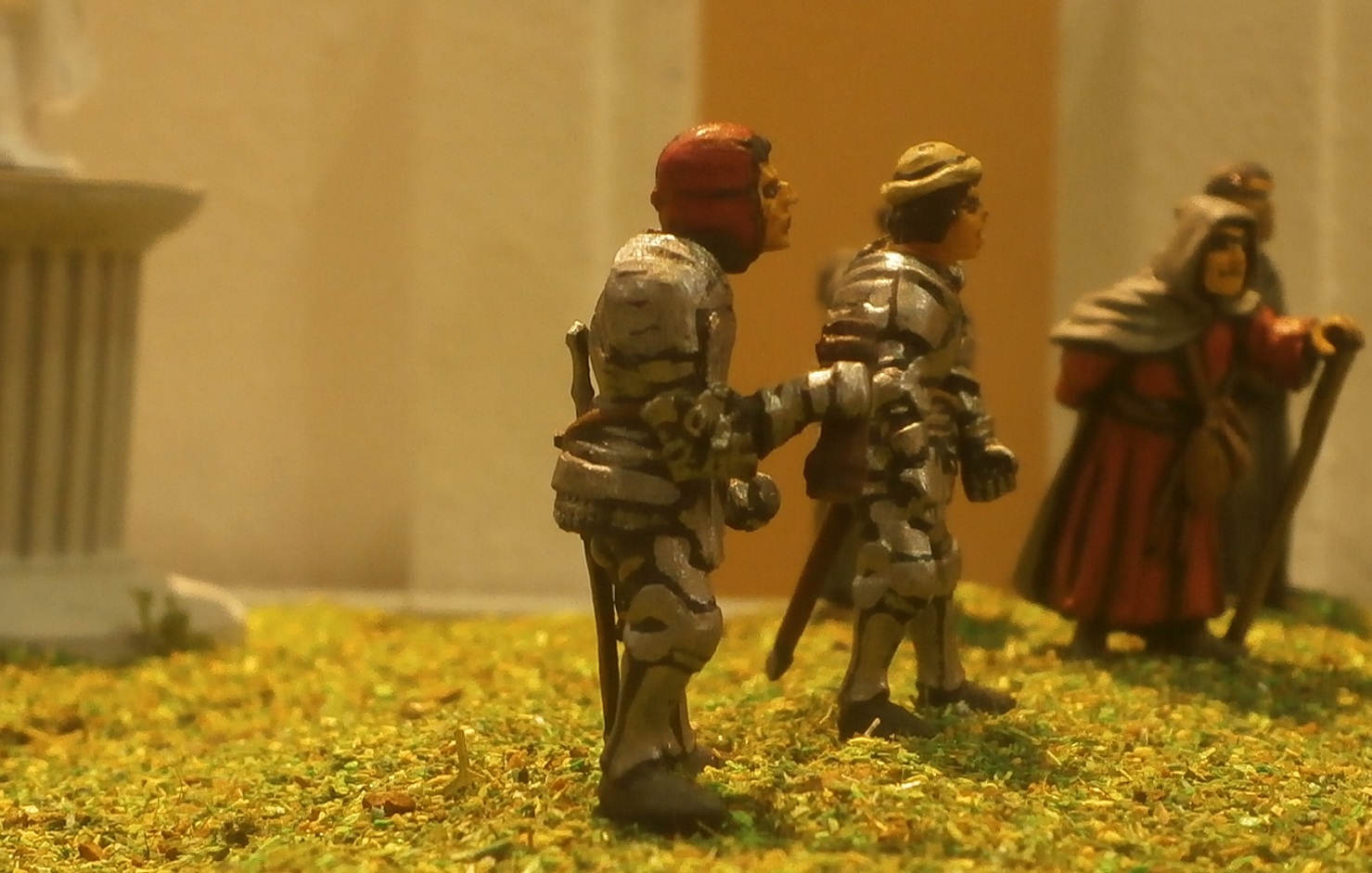
“Your holiness,” began the captain. “Much depends on what course you wish me to pursue. If we yield to their first demand, then it might buy us time to prepare for our defence.”
“Captain,” interrupted Tognazzi. “We cannot in good conscience hand over one of our greatest and most able citizens, innocent of any crime or treachery, and one who might well be the best instrument we have to employ against this threat. If anyone could discover or devise a means to thwart this terrible engine by anything other than brute force, without the death of hundreds of soldiers, it would be him.”
“Your grace,” answered the captain, “it is not for me to decide the maestro’s fate. But even if we choose not to give the maestro to them, we could still buy time simply promising to do so. Either way, there seem to me several possible strategies open to us, each of debatable efficacy. We might ask for relief from another state, to join us on the field of battle, so that any force dispatched against the foe is sufficient to the task. In which case who can we ask? Will they oblige us? Will they send sufficient strength? How quickly can their army reach us? And how might they avoid interception by the foe upon their march? Also, either hand in hand with forming such an alliance or not, how might we effectively prevent the enemy from approaching the city? By ruse or military action? Can we distract them, lure them away? Or, despite their claims of legions of guards, can we destroy their engines through sabotage? I can say that although the army has grown stronger since the losses on the Via Diocleta, and indeed gained a most welcome addition of the Cavalieri Benedetti, it has not yet regained the strength it had three years ago.
“But I will say, we only know that they once employed such a grenado, and all we know now is that they have sent this letter claiming to have more. And claiming to have an army. Surely, before we bow even to the pettiest of their demands, and certainly before sending such as the maestro to them, we should at least ascertain their strength, their whereabouts and crucially, whether they do have another bombard.”
“Wisely said,” declared the arch-priest of the church of Myrmidia. “Know thine enemy: his strengths and weaknesses, his disposition, his goals. None of these things can be ascertained from an enemy’s boastful and threatening letter.”
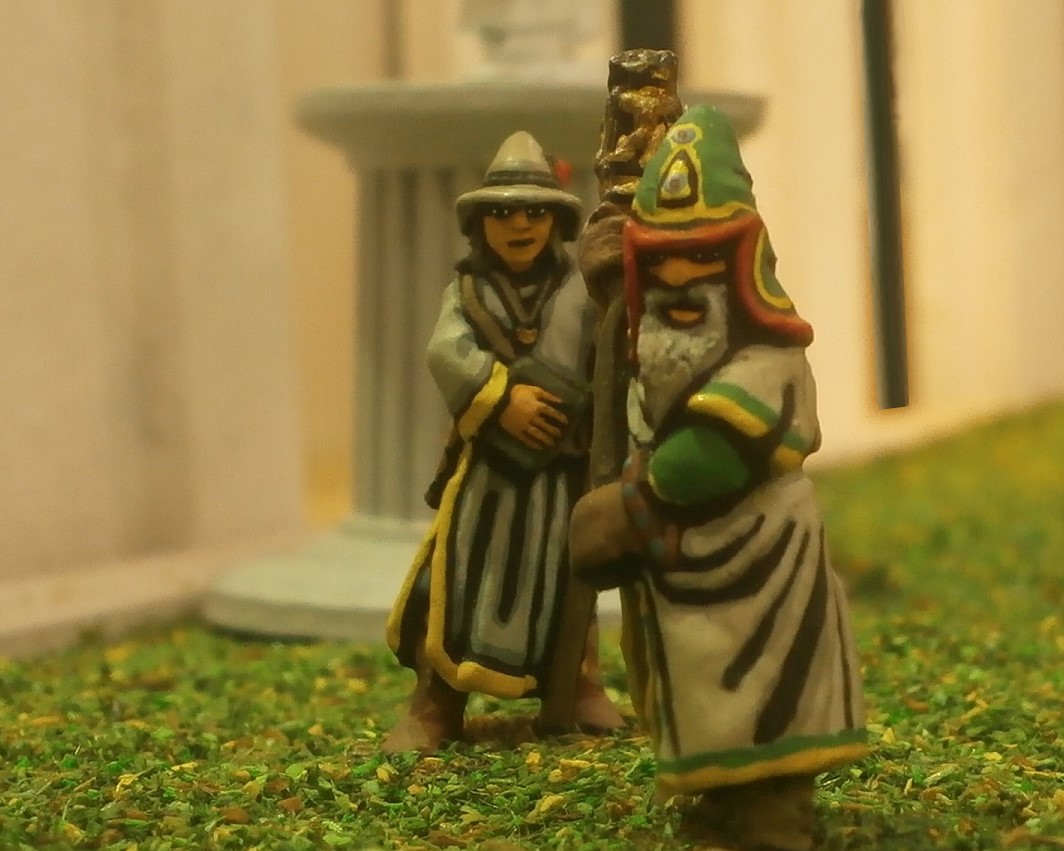
“If they are boasting about that which they actually have at their disposal,” said Father Benvenuto, “then we are in trouble!”
“’If’,” said Bernado. “Thank you, captain. As I see it, we thus have three tasks. Captain Ricci, learn what you can of the enemy force. Captain Lito, I command you to find out all you can about their engine.”
The young artillerist looked troubled.
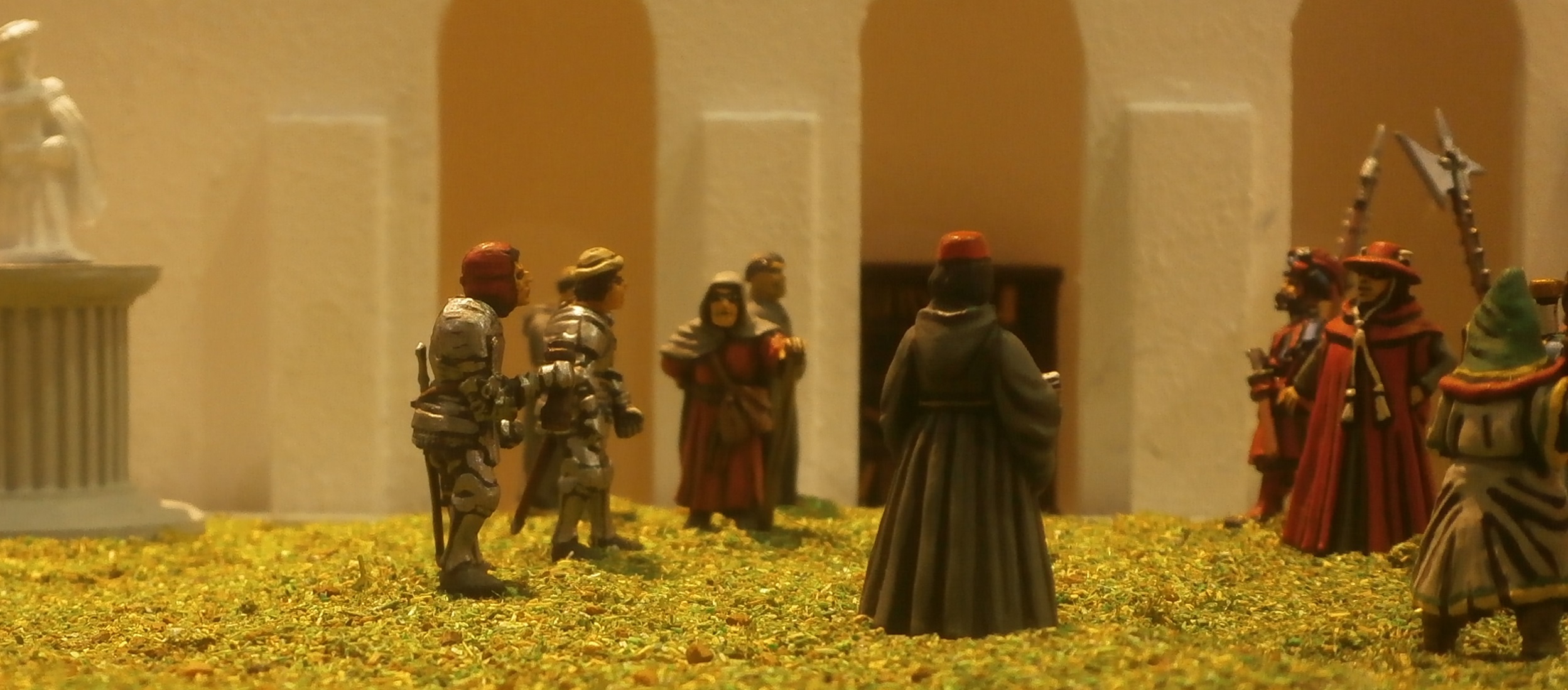
“Is this something you are afraid to do?” asked Bernado.
“No, your holiness. But would not the maestro be a better choice to ascertain the true nature of such a novelty as this bombard?”
“He might well be, but I think you can understand why he was not invited to this council,” explained Bernado. “Besides, we already know from Campogrotta the destruction they can cause. You must discover its whereabouts, its size, its composition, how it is moved, and how fast. These things I am sure you are just as capable of as the maestro.”
The captain gave a nod. “As you wish, your holiness.”
“Meanwhile,” said Bernado, “the rest of us must decide how exactly we will respond should the enemy’s claims prove true.”
“Your holiness,” asked Father Benvenuto, “are we to include accepting their terms, giving them the maestro, and later whatsoever they demand, as options in our deliberations?”
“If that proves to be the only option left to us to prevent the destruction of the city and the massacre of its population, then our hand may well be forced!”

Well done Padre! You’re campaign is unbelievable, and seeing the powerful forced to deal with such a dreadful threat is fascinating. The way you’ve written this, risking both great and small, and creating a story from the decisions of the participants in your great campaign, giving the characters a real degree of agency, salted with the vagaries of genuine chance that the dice bestow us lends this a veracity that is downright rare in fiction. Well done indeed!
LikeLiked by 1 person
I honestly feel like I am being ‘carried along’ by the campaign, which of course I am. All I have to do is turn the events into stories.
LikeLike
There’s some truth to that, but it takes real skill to make good stories out of it, and you make great stories. This doubtless inspires your players and makes the campaign better, too. 🙂
LikeLike